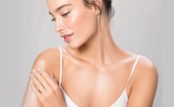Is your body a temple? The natural skin care industry seems to think so, and it’s riding a green wave of popularity among consumers, of products and services without the nasty chemicals and preservatives of traditional cosmetics. Natural skin care caters to an emerging market, and business is brisk.
Why natural? According to a 2007 study by the Environmental Working Group, the average North American adult takes in 168 hazardous chemicals every day. Of the 82,000 ingredients in personal care products, 10,000 of them are industrial chemicals. The skin absorbs all contact material, be it lipstick, deodorant or sunblock. And then it enters the bloodstream.
There’s also the green factor. Look at Avatar – the highest-grossing movie of all time made $2.8 billion at the box office, and hit close to home with the message that it’s not just cool to go green, it’s also the right thing to do.
Does this apply to your skin?
In some cases, it does. Natural skin care products are botanicals used since ancient times for their protective properties. Botanicals haven’t changed since then, but their use in the skin care industry is sometimes skewered by marketing. They’re often labelled “natural”, “green” and “organic”, but they’re so watered down, in some cases they’re less effective than synthetic products.
That said, experts suggest that botanicals may work as a preventative measure, to protect against future skin damage, rather than to restore existing concerns. If you’re interested in natural skin care, it’s advisable to target your approach, of a specific botanical for a specific concern.
Common botanicals to treat the skin include:
Argan oil – From a Moroccan tree, this oil is rich in Vitamin E. Argan oil is sometimes called “liquid gold” and it may prevent eczema, wrinkles and dry skin.
Soy – Used to reduce skin marks and pigmentation, soy is commonly used in products by L’Oreal and Skinceuticals. If it’s called “active soy” it’s been treated in a lab for potency.
Maitake mushrooms – Mushrooms go great with pasta, but this species does even better things for your skin. Maitaike mushrooms may alleviate rosacea and facial redness. More over, they’re ideal for people with hyper-sensitive needs.
Rhodiola – Sometimes called “golden root”, rhodiola comes from the Himalayas and is used to improve skin sensation and reduce dryness.
CoffeeBerry – From the fleshy outer casing of the coffee bean, some believe that CoffeeBerry has more antioxidants than berries and green tea. This makes it ideal for wrinkle and fine line prevention. You’ll find CoffeeBerry in the Revaleskin brand, which owns the proprietary name, but look around and you’ll find variations of CoffeeBerry in other skin products.
Resveratrol – Red wine gets many of its skin-protective qualities from polyphenols. Resveratrol is just that, a polyphenol and antioxidant that some believe can protect the skin from UV damage.
Green tea – Another antioxidant that’s right up there with red wine for health benefits, studies indicate that green tea protects skin from the sun’s harmful UV rays. Considering that sun damage constitutes 90% of skin aging, we could all use a little green tea.
Be aware that skin botanicals are potent, and can trigger allergic reactions in people with sensitive skin. Studies suggest they can prevent future damage, but won’t fix existing wrinkles or concerns. A more effective approach might be to balance natural skin care botanicals with synthetic products, preferably derived from botanicals, but with more kick.




